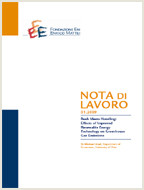Inflationary Effect of Oil-Price Shocks in an Imperfect Market: A Partial Transmission Input-output Analysis

03.02.2011
Libo Wu, Jing Li, ZhongXiang Zhang
Q43, Q41, Q48, O13, O53, P22, E31
Oil-price Shocks, Price Transmission, Price Control, Input-output Analysis, Inflation, Industrial Structure, China, the United States
Climate Change and Sustainable Development
Carlo Carraro
This paper aims to examine the impacts of oil-price shocks on China’s price levels. To that end, we develop a partial transmission input-output model that captures the uniqueness of the Chinese market. We hypothesize and simulate price control, market factors and technology substitution – the three main factors that restrict the functioning of a price pass-through mechanism during oil-price shocks. Using the models of both China and the U.S., we separate the impact of price control from those of other factors leading to China’s price stickiness under oil-price shocks. The results show a sharp contrast between China and the U.S., with price control in China significantly preventing oil-price shocks from spreading into its domestic inflation, especially in the short term. However, in order to strengthen the economy’s resilience to oil-price shocks, the paper suggests a gradual relaxing of price control in China.
